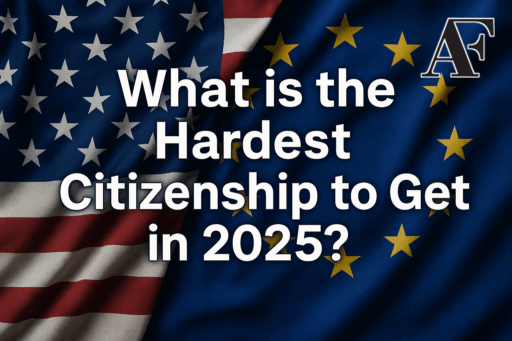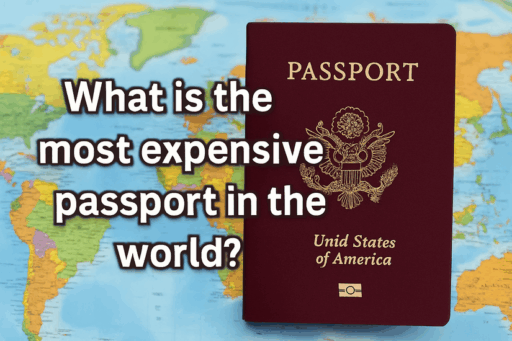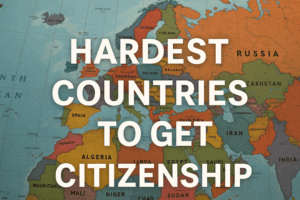Qatar stands as the most challenging country to obtain citizenship in 2025, requiring 25 years of continuous residency.
Other extremely difficult citizenships include Bhutan, China, and Switzerland, each imposing unique barriers.
These nations maintain stringent requirements that can take decades to fulfill.
Our discussion will include:
- What is the Hardest Citizenship to get?
- Hardest countries to get citizenship in Europe
- Most expensive passports in the world
If you are looking to invest as an expat or high-net-worth individual, you can email me (hello@adamfayed.com) or WhatsApp (+44-7393-450-837).
This includes if you are looking for a free expat portfolio review service to optimize your investments and identify growth prospects.
Some facts might change from the time of writing. Nothing written here is financial, legal, tax, or any kind of individual advice, nor is it a solicitation to invest or a recommendation of any specific product or service.

Hardest Countries to Get Citizenship
Qatar is one of the countries that make citizenship exceptionally hard to obtain, whether through birth, descent, or naturalization.
This comes amid tight laws, strict eligibility, or limited pathways for foreigners.
The list includes:
- China
- Bhutan
- Switzerland
- Japan
- Monaco
- Finland
Qatar Citizenship
Qatar emerges as the single most challenging citizenship to acquire globally in 2025. The Gulf nation requires foreigners to maintain continuous residency for 25 years before eligibility.
Applicants must demonstrate proficiency in the Arabic language and complete integration into Qatari society.
The country strictly prohibits dual nationality, forcing applicants to renounce their original citizenship.
The vast majority of Qatari citizens either inherit citizenship through birth or marriage to nationals.
Alternative pathways exist primarily for long-term government employees or significant investors.
The processing time spans several years even after meeting all requirements.
Qatar’s discretionary approval process means meeting requirements doesn’t guarantee citizenship acceptance.
China Citizenship
China presents another formidable challenge for foreign nationals seeking citizenship. The country largely reserves citizenship for individuals of Chinese descent or heritage.
Non-nationals face severely limited opportunities for naturalization through standard channels.
Marriage to Chinese citizens provides one pathway, requiring a minimum two-year residency.
The complex process typically necessitates professional legal assistance and extensive documentation.
Bhutan Citizenship
Bhutan maintains exceptionally restrictive citizenship policies in the Himalayan region.
Foreign applicants must reside continuously for at least 20 years before application eligibility.
The kingdom maintains absolute discretionary authority over all citizenship approvals. Any criticism of the monarchy during residency can result in application denial or citizenship revocation.
This creates an environment where residents must demonstrate unwavering loyalty throughout the lengthy process.

Switzerland Citizenship
Switzerland implements a notably rigorous naturalization system across its cantons. Standard applicants require at least 10 years of residence plus a C permit status.
The country maintains a complex local approval process involving community integration assessments too.
Municipal authorities often conduct interviews and community background checks before approval. Some cantons require additional language proficiency tests beyond federal minimums.
Japan Citizenship
Japan enforces strict naturalization rules that challenge most foreign applicants.
The country maintains high standards for economic stability and social integration.
Applicants face comprehensive background investigations spanning multiple years of residency.
Language proficiency requirements extend beyond basic conversation to formal business communication.
The process involves multiple government agencies and extensive documentation requirements.
Monaco Citizenship
Monaco represents extreme exclusivity in European citizenship acquisition.
The principality maintains minimal naturalization opportunities outside marriage or exceptional circumstances.
Residency requirements span multiple decades with substantial financial commitments required.
The tiny nation prioritizes maintaining its exclusive character through restrictive policies.
Applications undergo intensive scrutiny regarding financial background and social integration.
Finland Citizenship
Finland demonstrates Nordic stringency in citizenship policies despite EU membership.
The country requires extensive language proficiency in Finnish or Swedish. Cultural integration assessments examine applicants’ understanding of Finnish society and values.
Employment history and tax compliance receive a thorough examination throughout the process.
The timeline often extends beyond minimum requirements due to comprehensive evaluation procedures.
What is the Hardest EU Citizenship to get?
Switzerland is considered the most difficult European country for citizenship, even though it is technically outside the EU.
The list also includes:
- Austria
- Germany
- Denmark
- The Netherlands
Austria maintains restrictive policies despite full EU membership status.
The country requires extensive German language proficiency at advanced levels.
Integration courses spanning multiple years become mandatory for most applicants.
Financial independence standards remain high with strict employment history requirements.
Background investigations examine social integration and cultural adaptation thoroughly.
Germany implements comprehensive requirements despite historically welcoming immigration policies.
Applicants must demonstrate B1-level German proficiency through standardized testing systems.
Integration courses covering history, culture, and legal systems become mandatory requirements.
Three-year residency periods apply for standard naturalization.
Employment stability and tax compliance undergo extensive verification processes.
Denmark
Denmark enforces demanding language and cultural requirements across multiple assessment stages.
The country requires advanced Danish language proficiency exceeding basic communication needs.
Cultural integration tests examine knowledge of Danish history, politics, and social systems.
Financial self-sufficiency standards remain high with employment history verification requirements.
Background checks extend to family members and social connections.
The Netherlands maintains selective policies despite historical openness to immigration flows.
Civic integration examinations test Dutch language, history, and constitutional knowledge comprehensively.
Five-year residency requirements apply with strict continuous presence monitoring systems.
Employment and income stability receive a thorough assessment throughout the application period.
Background investigations examine criminal records and social integration patterns extensively.
What is the most expensive passport in the world?

Investment citizenship programs create the world’s most expensive passport acquisition opportunities globally.
These programs typically cost between $100,000 and $2 million, depending on the country.
- St. Kitts and Nevis pioneered modern investment citizenship with programs starting around $250,000.
- Turkey provides relatively affordable investment citizenship starting around $400,000 in qualifying investments.
- Portugal’s golden visa programs offer residency leading to citizenship through €500,000 investments.
- Caribbean nations dominate the affordable investment citizenship markets with competitive pricing structures.
- Dominica offers citizenship starting around $100,000 for single applicants through economic programs.
- Grenada provides similar opportunities with additional benefits, including US visa privileges.
- Antigua and Barbuda maintains programs starting around $100,000 with family inclusion options.
- Montenegro offers temporary programs during EU accession periods with elevated pricing structures.
- North Macedonia explores investment citizenship options as EU candidacy progresses.
These programs often include additional benefits like visa-free travel to numerous countries.
Processing fees significantly increase total costs beyond minimum investment requirements across programs.
Legal fees, due diligence costs, and government processing charges add substantial expenses.
Application timelines typically span 3-6 months for investment citizenship compared to decades otherwise.
Background investigations remain thorough despite expedited processing through investment channels.
How is the difficulty of getting citizenship determined?
Residency duration requirements serve as primary difficulty indicators across international citizenship systems. Key criteria include:
Residency Requirements
OECD countries maintain minimum stay requirements ranging from five to twelve years.
Longer residency periods create higher barriers for potential citizens seeking naturalization opportunities.
Countries like Qatar, requiring 25 years, represent extreme examples of extended requirements.
Language Proficiency
The standards significantly impact citizenship acquisition difficulty across different nations worldwide.
Some countries require native-level fluency, while others accept basic communication skills.
Technical vocabulary and formal writing abilities often become mandatory for professional integration.
Cultural context understanding beyond language mechanics frequently receives evaluation during testing procedures.
Financial Criteria
Financial requirements create substantial barriers for citizenship seekers lacking sufficient economic resources.
Income thresholds, employment stability, and tax compliance history undergo comprehensive scrutiny.
Citizenship by Investment programs demonstrate how financial capacity can expedite otherwise lengthy processes.
Economic integration assessments examine the potential contribution to national economic development goals.
Cultural and Social Integration
Cultural integration expectations vary dramatically between countries, emphasizing assimilation versus multiculturalism approaches.
Some nations require extensive knowledge of local customs, history, and political systems.
Others focus primarily on legal compliance and basic social adaptation requirements.
Integration courses and examinations test applicants’ understanding of societal norms and values.
Discretionary approval powers allow governments significant flexibility in citizenship decisions beyond stated requirements.
Administrative authorities can deny applications meeting technical standards for subjective integration concerns.
Political considerations sometimes influence approval rates depending on applicant origin countries.
Bureaucratic processes may extend timelines beyond published estimates through additional scrutiny.
Dual Citizenship Rules
Dual citizenship policies impact difficulty by requiring renunciation of original nationality in restrictive countries.
This creates emotional and practical barriers for applicants maintaining family or business ties.
Countries prohibiting dual citizenship force difficult choices between heritage and new opportunities.
Legal complexities arise when the origin countries don’t recognize renunciation procedures.
Pros and Cons of Pursuing Difficult Citizenship
Advantages
- Benefits of obtaining challenging citizenship often include exceptional passport strength and global mobility.
- Countries with restrictive policies typically offer superior visa-free travel opportunities worldwide.
- Economic benefits may include access to developed markets and superior social services.
- Educational opportunities in prestigious institutions become available through citizenship acquisition.
Disadvantages
- Drawbacks encompass significant time investments spanning decades of committed residency requirements.
- Financial costs extend beyond direct expenses to opportunity costs of extended waiting.
- Cultural adaptation challenges may create psychological stress during lengthy integration periods.
- Family separation risks increase when origin countries prohibit dual citizenship arrangements.
Key Takeaways
- Qatar maintains the world’s most restrictive citizenship policies, requiring 25-year residency commitments and Arabic proficiency.
- China, Bhutan, and Switzerland create additional formidable barriers through ethnic preferences, political loyalty, and complex approval processes.
- European citizenship difficulty varies significantly, with Switzerland leading restrictive policies despite EU proximity.
- Investment citizenship programs offer expensive alternatives ranging from $100,000 to $2 million across various countries.
- Caribbean nations provide affordable options while European programs command premium pricing for EU benefits.
- Processing times have reduced dramatically through investment channels compared to traditional naturalization pathways.
- Citizenship difficulty determination involves multiple factors, including residency duration, language proficiency, financial capacity, and cultural integration.
- Discretionary approval powers create uncertainty even when meeting stated technical requirements completely.
- The global citizenship landscape continues evolving, with some countries restricting access while others compete for talent.
- Investment programs may face increased scrutiny as governments balance revenue generation with security concerns.
- Traditional naturalization pathways remain the primary options for most individuals seeking citizenship acquisition.
Understanding specific country requirements becomes essential before committing to lengthy residency periods and integration processes.
Professional legal consultation helps navigate complex regulations and maximize approval chances.
Alternative citizenship options through ancestry or marriage may provide viable pathways around restrictive naturalization systems.
Pained by financial indecision?

Adam is an internationally recognised author on financial matters with over 830million answer views on Quora, a widely sold book on Amazon, and a contributor on Forbes.



